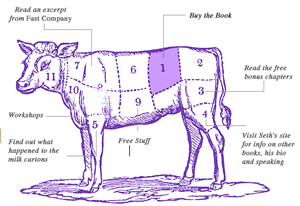Familiarity in the Recommendosphere
Daring Fireball‘s John Gruber makes a great point in his recent post: Familiarity Breeds a User Base
In referencing Joshua Micah Marshall’s two reasons for not using a Mac (despite admitting that he’s heard great things about them), Gruber suggests that we underestimate the power of familiarity. He says:
“But the reasons behind his (Marshall’s) reluctance to switch are eminently reasonable, or, if not quite reasonable, understandable. He’s a political nerd, not a computer nerd, but he’s cobbled together enough knowledge about Windows and PC hardware that he’s comfortable knowing he can get his work done with them, and that when things go wrong, that he can probably fix them.”
Daring Fireball‘s John Gruber makes a great point in his recent post: Familiarity Breeds a User Base
In referencing Joshua Micah Marshall’s two reasons for not using a Mac (despite admitting that he’s heard great things about them), Gruber suggests that we underestimate the power of familiarity. He says:
“But the reasons behind his (Marshall’s) reluctance to switch are eminently reasonable, or, if not quite reasonable, understandable. He’s a political nerd, not a computer nerd, but he’s cobbled together enough knowledge about Windows and PC hardware that he’s comfortable knowing he can get his work done with them, and that when things go wrong, that he can probably fix them.”
This insight could also be called the “good enough” principle. If what we are familiar with is good enough, then there really isn’t an incentive for us to change what we’re doing. After all, we know what we’re doing now, and any change would set us back at least temporarily.
How to get familiar?
However, I’m a little more optimistic than Gruber is about what, if anything, Apple can do about getting folks using Macs. I’ve seen their products garner loyal fans. In fact I live with two of them.
My wife loved my Powerbook so much that we went and bought her an iBook. Then, her father loved that so much that he went and bought his own. (By the way, I can imagine that Windows boxes get fans like this, but I haven’t actually experienced it myself.)
The problem is that the remedy for Apple is very costly: getting people to actually use a Mac. It’s not easy to get someone to sit down and use a Mac for any extended period of time, and for a computer that is crucial to getting used to it. You can’t get familiar with a Mac by going to the Apple Store a couple times.
Thankfully, with web-based software you have the ability to provide brain-dead easy test drives of it.
Not about advertising
My wife and father-in-law using a Mac and wanting one is, at first glance, not a big deal. I like that, and I want one myself. But one thing that isn’t apparent is that Apple’s marketing had nothing to do with this. In a sense, their marketing was worthless to these two people. It was all about the actual use of the machine.
For anybody who is familiar with Seth Godin‘s books, you’ll instantly recognize this as a manifestation of what he’s been talking about for years. This is the essence of his Purple Cow idea.

A Purple Cow, according to Godin, is what you need to make in today’s attention-strained landscape. Because there are so many people trying to spread so many messages (advertising), you need a product that actually does the spreading for you. That spreading occurs when the people who use your product like it so much that they tell everyone else. So you don’t have to.
Godin would point out that this changes the game dramatically. First, you need much less advertising because your customers do that for you. Second, you have to focus more on your product, making sure that it is remarkable enough to get people talking. Third, you can help this along by enabling your users to spread the word.
The strategy of the recommendosphere
Overall, it’s a really simple strategy: Focus like nuts on your product and let your users advertise it for you.
Oh, and here’s an update: Joshua Micah Marshall now owns a new Mac.
To which I can only say: Welcome to the Recommendosphere.
Previous
Next